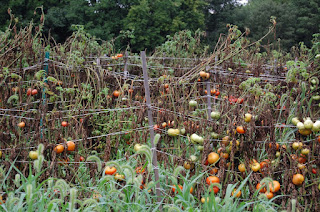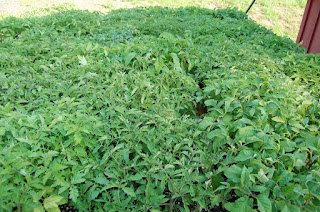Each spring brings the beginning of a new farm season. Tasks from previous years need to be repeated. The wheel turns and events repeat themselves. There is a sense of stability in the repetitive nature of farming, a sense of reassurance in the renewed beginning of a new season. And while all of this is true for Farmer David there is a different sense of anticipation, excitement, and trepidation in that Farmer David is establishing a brand new farm. Just as you plant the seeds that will grow into plants, David is 'planting' and establishing his own roots with Z Food Farm.
As it is in other endeavors, getting things accomplished at a farm always seems to take longer than one would like. This has been especially true in putting the parts together for the green house (more details and pictures about the green house will be in the next posting). Be that as it may, there has been movement forward at Z Food Farm. A tractor has been purchased. Seeding has started. A mail box has been posted. And there has been progress in the building of the green house. There is a little over two months to go before market season starts and there seems to be so much that still needs to be done. In the spirit of Ken Kesey and the Merry Pranksters, there is only one way to go, 'Further'.
If you are going to grow stuff you need to plant the seed in seeding trays with the proper soil mix. Here David is mixing up a batch of soil. There are various components that go into the soil mix- peat moss, vermiculite, lime, greensand, and a couple of other things.While traditional fertilizers can not be used in organic farming, the basic peat moss can be enhanced to provide good growing conditions for the newly planted seeds.

(NOTE- A big shout out of thanks to Farmer Matt at Cherry Grove Organic Farm. Matt, knowing that David's green house would not be finished in time for the beginning of seeding, offered David space in his green house. Also, in a variety of other ways Matt has provided David with assistance. David is greatly appreciative of all that Matt has done for him.)
Once the seeds have been placed in the trays and covered with the soil mix they need to be watered. It sounds obvious, and it is, but the process of watering can not be taken for granted. At all stages of growth, from the initial seeding to the time when the seedlings are planted in the ground, the trays need to be thoroughly watered. While David is doing this initial watering by hand, Farmer Matt has a watering system within his green house that saves an amazing amount of time. David will be installing a similar system in his green house.

This is the first days seeding. While this may not seem to be all that much, these trays are full of bunching onions. Each cell contains 5-6 seeds. One reason for so many seeds per cell is that not all of the seeds will germinate. Another reason is that these are onions that will be harvested and sold in bunches rather than individually.

Here it is, Farmer David's first tractor. It is a Ford 1710. This particular tractor was built in 1986. The tractor was refurbished and is in great condition. Long may you run.

And here is Farmer David peering into the future, contemplating what adventures lie ahead. Needless to say the hope is that the adventures, while challenging, will be surmountable. Go forth young farmer.

That's all for now. Next posting will detail the putting up of the green house. Until then healthy eating and peace to all.











































